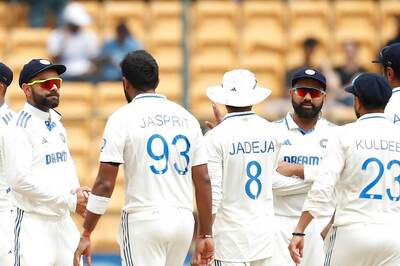
views
With malnutrition or undernutrition accounting for nearly one third of all childhood deaths in India, it is also a major risk factor in children, especially those below the age of five, for developing tuberculosis (TB), experts have said.
Tuberculosis is one of the top 10 causes of death globally and approximately 500,000 children are diagnosed with the disease annually, according to the World Health Organization (WHO) estimates.
In 2015, one million children (below 14 years) fell prey to TB, whereas 170,000 of them died worldwide.
"Undernutrition lowers the body's immunity, making it easier for the bacteria to attack an individual and makes the fight against tuberculosis more difficult," Sunil Kumar Mehendiratta, Senior Consultant and HOD (Department of Paediatrics) at Venkateshwar Hospital, Dwarka, told IANS.
"Infants and children under the age of five are probably the most vulnerable, to developing both the infection and the disease. Children harbouring latent infection are also at the risk of TB re-activation in adulthood," Mehendiratta added.
Tuberculosis is caused by mycobacterium tuberculosis bacterium that most often begins by affecting the lungs and can then spread to other body parts. On an average, 10-15 per cent of all TB patients are under the age of 14.
As many as 81,482 cases of TB among children were detected in 2012, accounting for seven per cent of all TB cases in the country, as per a national report titled 'TB in India'.
"There has been a steep rise in TB cases among children in India. In a month, I see nearly seven to 10 new cases. It is sad to see children below the age of five visiting OPDs with TB. The most unfortunate part is the lack of awareness, proper diagnosis and treatment in case of childhood TB," added Rahul Nagpal, Director (Department of Paediatrics) at Fortis Flt. Lt. Rajan Dhall Hospital, New Delhi.
Six countries account for 60 per cent of the total TB cases with India leading the count, followed by Indonesia, China, Nigeria, Pakistan and South Africa, the WHO said.
In India, 39 per cent of children are stunted, 21 per cent of children are wasted, and 36 per cent of children are underweight, according to data provided by the recent National Family Health Survey (NFHS)-4 which showed how prevalent undernutrition is in India, thereby increasing the risk of TB in the country.
Furthermore, the emergence of multi-drug resistant TB and complications aggravated by high rates of co-infection with HIV-AIDS has renewed the threat of the epidemic in the country, the doctor said.
Poverty, malnutrition, poor housing and sanitation, compounded by other risk factors such as HIV, tobacco, alcohol use and diabetes, can put people at heightened risk of TB and make it harder for them to access care.
"Contrary to perception, not just children living in slums and unhygienic conditions, even those from relatively affluent backgrounds are diagnosed with TB," Mehendiratta said.
TB patients require higher levels of energy and metabolic immunity to cope with the infection, and understandably this need is higher in children during to their growth phase.
"Diet plays a very important role in combating TB. Undernourished and malnourished children are also more susceptible to a relapse," Jamhoih (Jamie) Tonsing, Regional Director, at The International Union Against Tuberculosis and Lung Disease (The Union) - South-East Asia Office, a non-profit scientific organisation, told IANS.
"Fighting TB requires a diet rich in fats, vitamins, minerals and proteins. Immediate interventions should include food supplementation programmes, such as the Public Distribution System, Integrated Child Development Services and Mid-day Meal Programme which can enhance the value of foods supplied and target families who actually need them," Tonsing added.
Parents must encourage children to adopt a healthy lifestyle that can help in staying protected from the potentially dangerous bacteria and keep their immune system healthy.

















Comments
0 comment